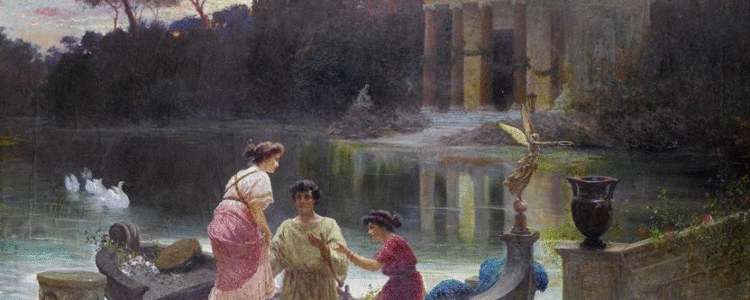How did one join a burial club?
The poorest of Romans often received no burial at all, but were simply tossed into open pits outside of the city (puticuli). One is estimated to contain 24,000 corpses. Burial clubs insured that members received a decent interment.
Where did the Ascension of Jesus occur?
The Ascension occurred 40-days after the Resurrection on the Mount of Olives, in or near the town of Bethany. Acts 1:9-12 “They returned to Jerusalem from the hill called the Mount of Olives.” Luke 24:50-51 "And He led them out as far as Bethany, and He lifted up His hands and blessed them. And it came about that while He was blessing them, He parted from them."
Within the city limits of Ancient Rome were many planted areas. During the second century A.D., approximately what percentage of the town was green?
In addition to gardens and parks, the city had an astonishing number of buildings and monuments. Among them were 40 triumphal arches, 12 forums, 28 libraries, 11 large bath complexes, 1000 public baths, 100 temples, 3500 bronze statues and 1352 street fountains.
What were the first written laws of Rome?
The 12 Tables were statutes defining private rights and procedures. A commission of ten men was appointed to draw up the first ten Tables, then a second group of ten to write the last two. Inscribed in bronze around 450 BC, the original Tables are no longer extant. They may have been destroyed when the Gauls sacked Rome in 387 B.C. As a boy in school, Cicero claimed to have learned them by heart, but that "no one did so any longer" (106-43 B.C.).
What Roman emperor would only trim his hair when the moon was in conjunction with the sun?
Tiberius, the second emperor of Rome, had a predilection towards superstition. Suetonius records that "he wore his thinning hair untidily long at the nape of the neck, and cut it only when the moon was in conjunction with the sun." (See: Tiberius)
In 5 B.C., how many inhabitants of Rome received a free monthly grain dole?
There were only three eligibility requirements for grain allotments. The recipient had to be an adult, a male, and a citizen. Grain was distributed from the temple of Ceres, and was not available to those living outside of Rome.
Isaiah 22:22 refers to a location of keys. Which is correct?
Most ancient keys were enormous, and were considered a symbol of elevated position and authority. The more keys you carried, the higher your status. Often numerous keys were attached to a kerchief, tied around the neck, and then draped over the back shoulder. Isaiah 22:22 "Then I will set the key of David on his shoulder..." (See Puzzling Scriptures: Key Upon His Shoulder)
Since there were neither water or traps in Roman toilets, a connection with the sewer would have allowed what to enter?
A number of sources record the swampy nature of ancient Rome. During the wet season, a ferry service operated between the main hills of the city. To combat this problem, a drainage system called the Cloaca Maxima, or great sewer, was built. A home's direct connection to the pipe served as a point of entrance for gasses and vermin. According to Aeolian, the house of a fish merchant was invaded each night by a rogue octopus, raiding his stock of preserved fish (Aeolian, On Animals 13.6).
Guests invited to the home of Augustus were often given a sack of coins with which to gamble. What amount of money did it contain?
In a letter written to his daughter, Augustus wrote: "I send you two hundred and fifty denarii, the sum which I give each of my guests, in case they wish to play at dice or at odd and even during the dinner." Suetonius, The Lives of the Twelve Caesars, Book II Augustus, 71.
How many liters of wine did the average ancient Roman consume in per year?
Roman wine tended to be sweet with a high alcohol content. Because of its perceived medicinal value, soldiers were required to drink 1-liter a day, full strength. Pliny the Elder recommended adding “seawater to enliven the smoothness." Cato liked to drink his wine flavored with a drop of pig's blood and a pinch of marble dust. At family meals it was diluted 3 to 1 with water.
Share your Results :
Share your Results :
Share your Results :
Share your Results :
Share your Results :
Please share this quiz to view your results.
